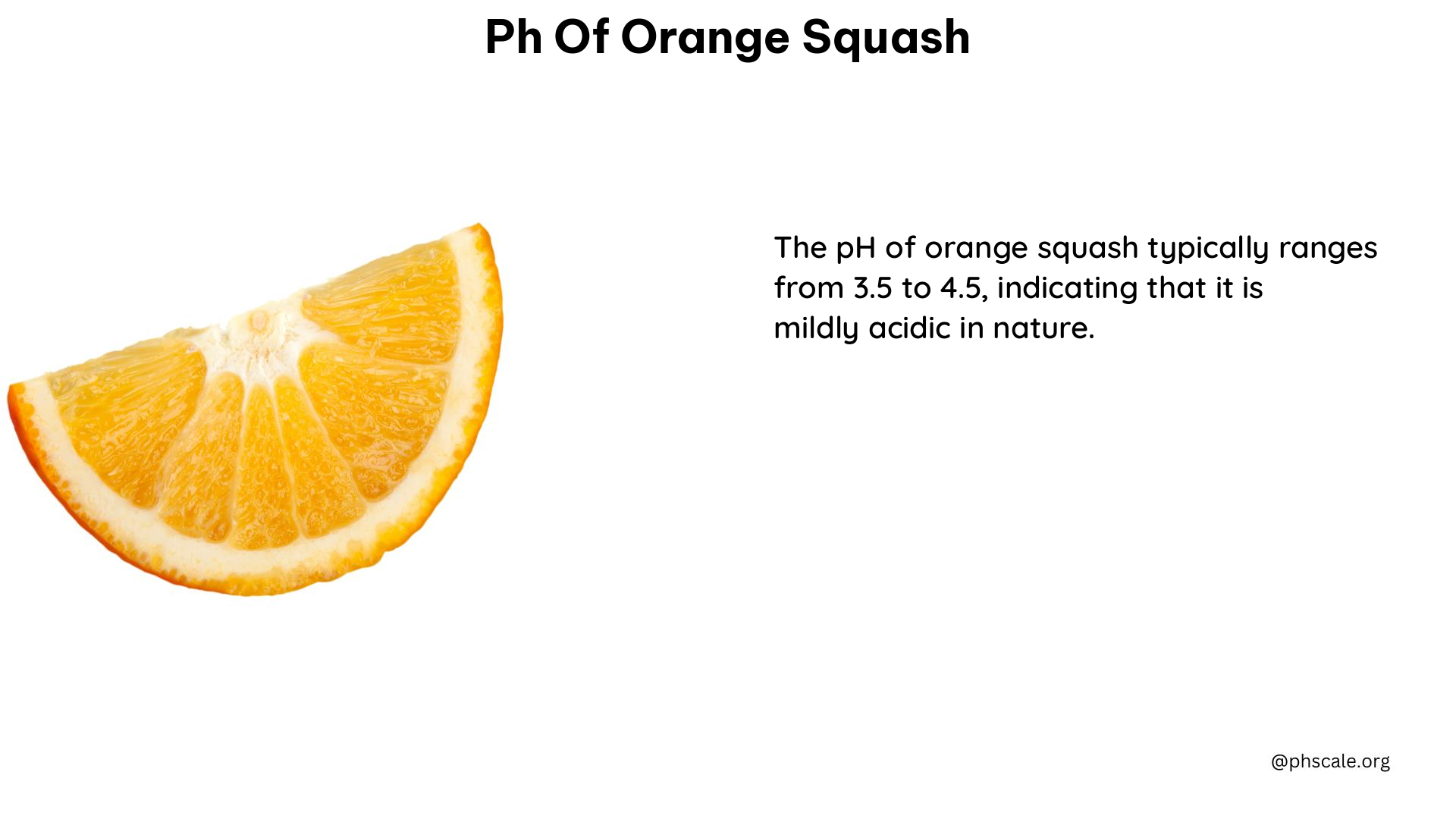The pH of orange squash is typically around 3.56, which falls into the acidic range. This acidity can contribute to dental erosion if consumed excessively. Understanding the pH of orange squash and its potential impact on oral health is crucial for making informed choices about this popular beverage.
Understanding the pH Scale
The pH scale is a measure of the acidity or basicity (alkalinity) of a substance, ranging from 0 to 14. A pH value of 7 is considered neutral, while values below 7 are acidic, and values above 7 are basic or alkaline. The lower the pH value, the more acidic the substance.
Comparing the pH of Orange Squash to Other Drinks

Orange squash has a pH of approximately 3.56, which is slightly more acidic than some other common beverages:
| Beverage | pH |
|---|---|
| Orange Squash | 3.56 |
| Milk | 6.76 |
| Cherry Coke | 2.17 |
| Orange Juice | 3.3 |
| Lemon Juice | 2.0 |
As you can see, orange squash is more acidic than milk but less acidic than some soft drinks and fruit juices.
The Impact of Acidity on Dental Health
The acidity of orange squash can have a significant impact on dental health, particularly when it comes to dental erosion. Dental erosion is the gradual loss of tooth enamel, the hard, protective outer layer of the teeth, due to exposure to acidic substances.
When you consume orange squash, the acidity can soften and dissolve the tooth enamel, making it more susceptible to further damage and decay. This can lead to increased sensitivity, discoloration, and even the formation of cavities.
To minimize the risk of dental erosion, it is recommended to:
- Consume orange squash in moderation and as part of a balanced diet.
- Avoid sipping on orange squash for extended periods, as this prolonged exposure can be more damaging to teeth.
- Rinse your mouth with water or chew sugar-free gum after consuming orange squash to help neutralize the acidity.
- Wait at least 30 minutes before brushing your teeth to allow the enamel to remineralize and harden.
Balancing the Acidity of Orange Squash
To help balance the acidity of orange squash, you can try the following:
- Mix with a More Alkaline Drink: Combine orange squash with a drink that has a higher pH, such as milk or a non-carbonated mineral water, to help neutralize the acidity.
- Consume with Calcium-Rich Foods: Eating foods rich in calcium, such as cheese, yogurt, or leafy greens, can help remineralize the tooth enamel and counteract the effects of the acidity.
- Add a Pinch of Baking Soda: Carefully adding a small amount of baking soda (sodium bicarbonate) to the orange squash can help raise the pH and reduce the acidity. However, be cautious not to overdo it, as excessive baking soda can alter the flavor and nutritional content.
Homemade Orange Squash: A Healthier Alternative
For a more controlled and healthier option, you can consider making your own orange squash at home. This allows you to regulate the ingredients and pH to better suit your dietary needs and preferences.
To make homemade orange squash, you can follow these steps:
- Squeeze fresh oranges to obtain the juice.
- Dilute the orange juice with water, adjusting the ratio to your desired sweetness and acidity level.
- Sweeten the mixture with a natural sweetener, such as honey or stevia, if desired.
- Optionally, you can add a pinch of baking soda to help balance the acidity.
By making your own orange squash, you can ensure that it contains minimal additives and preservatives, and you can tailor the pH to your liking.
Conclusion
The pH of orange squash, typically around 3.56, places it in the acidic range. This acidity can contribute to dental erosion if consumed excessively. To mitigate the potential impact on oral health, it is essential to consume orange squash in moderation, pair it with alkaline or calcium-rich foods, and practice good oral hygiene habits.
By understanding the pH of orange squash and taking proactive steps to balance its acidity, you can enjoy this refreshing beverage while maintaining the health of your teeth and gums.
References:
1. https://markdannerdmd.com/downloads/table-beverage-acidity.pdf
2. https://www.researchgate.net/figure/pH-of-fruit-juices-and-fruit-drinks_tbl3_285672746
3. https://www.picotech.com/library/results/ph-level-drinks-drdaq
